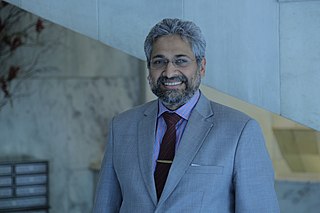Related Research Articles
Journalism is the production and distribution of reports on the interaction of events, facts, ideas, and people that are the "news of the day" and that informs society to at least some degree. The word, a noun, applies to the occupation, the methods of gathering information, and the organizing literary styles. Journalistic media include print, television, radio, Internet, and, in the past, newsreels.

A journalist is an individual that collects/gathers information in form of text, audio, or pictures, processes them into a news-worthy form, and disseminates it to the public. The act or process mainly done by the journalist is called journalism.
Investigative journalism is a form of journalism in which reporters deeply investigate a single topic of interest, such as serious crimes, political corruption, or corporate wrongdoing. An investigative journalist may spend months or years researching and preparing a report. Practitioners sometimes use the terms "watchdog reporting" or "accountability reporting."

Citizen journalism, also known as collaborative media, participatory journalism, democratic journalism, guerrilla journalism or street journalism, is based upon public citizens "playing an active role in the process of collecting, reporting, analyzing, and disseminating news and information." Similarly, Courtney C. Radsch defines citizen journalism "as an alternative and activist form of news gathering and reporting that functions outside mainstream media institutions, often as a response to shortcomings in the professional journalistic field, that uses similar journalistic practices but is driven by different objectives and ideals and relies on alternative sources of legitimacy than traditional or mainstream journalism". Jay Rosen offers a simpler definition: "When the people formerly known as the audience employ the press tools they have in their possession to inform one another." The underlying principle of citizen journalism is that ordinary people, not professional journalists, can be the main creators and distributors of news. Citizen journalism should not be confused with community journalism or civic journalism, both of which are practiced by professional journalists; collaborative journalism, which is the practice of professional and non-professional journalists working together; and social journalism, which denotes a digital publication with a hybrid of professional and non-professional journalism.
A journalism school is a school or department, usually part of an established university, where journalists are trained. 'J-School' is an increasingly used term for a journalism department at a school or college. Journalists in most parts of the world must first complete university-level training, which incorporates both technical skills such as research skills, interviewing technique and shorthand and academic studies in media theory, cultural studies and ethics.

Siddharth Varadarajan is a journalist and editor in India. He was a former editor of the English language national daily The Hindu, and is one of the founding editors of the Indian digital news portal The Wire, along with Sidharth Bhatia, and M. K. Venu.

Madhyamam is a Malayalam-language newspaper published in Kerala, India, since 1987. It was founded by Ideal Publications Trust run by the Jamaat-e-Islami Hind wing in Kerala. It has nine editions in India and its Persian Gulf edition Gulf Madhyamam has nine in the Middle East.

Tehelka is an Indian news magazine known for its investigative journalism and sting operations. According to the British newspaper The Independent, the Tehelka was founded by Tarun Tejpal, Aniruddha Bahal and another colleague who worked together at the Outlook magazine after "an investor with deep pockets" agreed to underwrite their startup. Bahal left Tehelka in 2005 to start Cobrapost – an Indian news website, after which Tehelka was managed by Tejpal through 2013. In 2013, Tejpal stepped aside from Tehelka after being accused of sexual assault by his employee. Tehelka had cumulative losses of ₹66 crore (US$8.3 million) till 2013, while being majority owned and financed by Kanwar Deep Singh – an industrialist, a politician and a member of Indian parliament.

Palagummi Sainath is an Indian columnist and author of the acclaimed book Everybody Loves a Good Drought. He has extensively written on rural India, his notable interests are poverty, structural inequities, caste discrimination and farmers protests.

Sucheta Dalal is an Indian business journalist and author. She has been a journalist for over two decades and was awarded a Padma Shri for journalism in 2006. She was the Financial Editor for the Times of India until 1998 when she joined the Indian Express group as a Consulting Editor, leaving in 2008. She is known for exposing the 1992 stock market scam propagated by Harshad Mehta.
The Press Council of India is a statutory, adjudicating organisation in India formed in 1966 by its parliament. It is the self-regulatory watchdog of the press, for the press and by the press, that operates under the Press Council Act of 1978. The council has a chairman – traditionally, a retired Supreme Court judge, and 28 additional members of which 20 are members of media, nominated by the newspapers, television channels and other media outlets operating in India. In the 28 member council, 5 are members of the lower house and upper house of the Indian parliament and three represent culture literary and legal field as nominees of Sahitya Academy, University Grant Commission and Bar Council of India.

Nidhi Razdan is an Indian journalist and television personality. She was the executive editor of NDTV and the primary anchor of NDTV 24x7 news debate show Left, Right & Centre, and the weekly debate show The Big Fight.

Indian Institute of Mass Communication (IIMC) is an Indian media centre of learning and civil service training institute for the Indian Information Service Cadre funded and promoted by the Government of India in New Delhi. The IIMC is an autonomous society under the Ministry of Information and Broadcasting. The then Minister in charge of Information and Broadcasting, Indira Gandhi formally inaugurated the institute on 17 August 1965.

Ravish Kumar is an Indian journalist, author and media personality. He was the Senior Executive Editor of NDTV India. He hosted a number of programmes including the channel's flagship weekday show Prime Time, Hum Log, Ravish Ki Report, and Des Ki Baat.
Pushpa Girimaji is an author, journalist, consumer rights columnist and consumer safety advocate. She is the only Indian journalist to have written a weekly consumer column continuously for over three decades.
The People's Archive of Rural India is a multimedia digital journalism platform in India. It was founded in December 2014 by veteran journalist Palagummi Sainath, former rural affairs editor of The Hindu, author of the book Everybody Loves a Good Drought and winner of over 50 national and international awards, including the Statesman Award for Rural Reporting (1994), the Prem Bhatia Memorial Prize (2004), the Ramnath Goenka Excellence in Journalism Award (2009), the United Nations Food & Agriculture Organization's Boerma Prize (2000), the Ramon Magsaysay Award for Journalism, Literature and Creative Communications Arts (2007), and the World Media Summit Global Award for Excellence 2014, in Public Welfare reporting.

The Wire is an Indian nonprofit news and opinion website which publishes in English, Hindi, Marathi, and Urdu. It was founded in 2015 by Siddharth Varadarajan, Sidharth Bhatia, and M. K. Venu. The publication's reporters have won several national and international awards, including three Ramnath Goenka Excellence in Journalism Awards and the CPJ International Press Freedom Award. It has also been subject to several defamation suits by businessmen and politicians.

The Quint is an English and Hindi language Indian general news and opinion website founded by Raghav Bahl and Ritu Kapur after their exit from Network18. The publication's journalists have won three Ramnath Goenka Excellence in Journalism Awards and two Red Ink Awards.

The Ramnath Goenka Excellence in Journalism Awards are one of the awards in India in the field of journalism. Named after Ramnath Goenka, the awards have been held annually since 2006, with the 12th edition being held in 2017. The awards are given for both print journalism as well as broadcast journalism, with a total of 25 different prizes being awarded in 2017 for excellence in journalism during 2016.

Scroll.in, simply referred to as Scroll, is an Indian digital news publication owned by the Scroll Media Incorporation. It publishes content in both Hindi and English languages. Founded in 2014, the website and its journalists have won several national and international awards including four Ramnath Goenka Excellence in Journalism Awards and the CPJ International Press Freedom Awards.